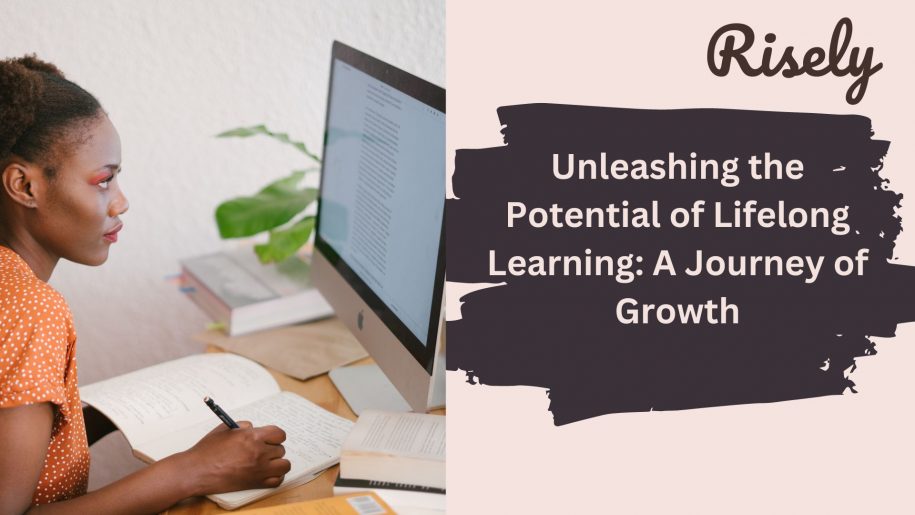Unleashing the Potential of Lifelong Learning: A Journey of Growth
Welcome to a journey that knows no boundaries and recognizes no limits—the world of lifelong learning. In a rapidly evolving landscape, where knowledge is power and adaptability is key, pursuing learning is an unwavering commitment that transcends age, profession, and circumstance. Keep reading as we delve into a lifelong learning mindset’s significance, benefits, and pathways. Let’s embark on this enriching odyssey, where the thirst for knowledge is never quenched, and growth knows no bounds.What is lifelong learning?
Lifelong learning refers to the ongoing process of acquiring new knowledge, skills, and competencies throughout life. It goes beyond traditional educational settings and formal education, encompassing a continuous pursuit of learning in various contexts, including work, personal interests, hobbies, and everyday experiences. It recognizes that learning is a dynamic and evolving journey that contributes to personal and professional growth, adaptability, and the ability to thrive in a rapidly changing world.Why is lifelong learning important?
Lifelong learning holds immense importance in both personal and professional life due to the evolving nature of society, technology, and work. Some reasons why it is crucial:- Adaptation to change: In a rapidly changing world, new technologies, industries, and skills emerge. Lifelong learning helps individuals stay relevant, adapt to new circumstances, and remain competitive in their careers.
- Skill enhancement: It allows individuals to continuously acquire new skills and knowledge, enabling them to perform better in their current roles and explore new career opportunities.
- Career advancement: Continuous learning enhances career prospects by showcasing an individual’s commitment to growth, making them attractive candidates for promotions and leadership roles.
- Innovation: Learning beyond one’s comfort zone fosters creativity and innovation, encouraging individuals to think critically, solve problems, and generate fresh ideas.
- Personal fulfillment: Engaging in learning nurtures personal growth, stimulates intellectual curiosity, and offers a sense of achievement and self-confidence.
- Future-proofing: Given the uncertain nature of industries and job roles, life long learning is a strategy to ensure individuals are prepared for any future challenges.
4 pillars of lifelong learning
Lifelong learning is supported by four essential pillars that provide a foundation for continuous growth and development. These pillars encompass various aspects of the learning journey and contribute to the holistic pursuit of knowledge and skills:- Curiosity and exploration: Curiosity is the spark that ignites the desire to learn. Embracing curiosity encourages individuals to explore new subjects, ask questions, and seek learning opportunities. Maintaining an open and inquisitive mindset, individuals remain receptive to new ideas, experiences, and knowledge.
- Self-directed learning: Self-directed learning empowers individuals to take control of their learning journey. This pillar involves setting personal goals, selecting learning resources, and managing the learning process independently. By actively driving their learning experiences, individuals can tailor their education to align with their interests and aspirations.
- Adaptability and flexibility: Learning requires adaptability and flexibility to accommodate changing circumstances, technologies, and needs. This pillar emphasizes the importance of being open to new approaches, embracing emerging technologies, and adjusting learning strategies to stay relevant in evolving environments.
- Continuous improvement and reflection: Reflective practice is a cornerstone of life long learning. Regularly reviewing one’s learning experiences, identifying areas for improvement, and adjusting strategies based on feedback contribute to ongoing growth. This pillar also involves seeking feedback from mentors, peers and self-assessment to refine learning approaches.
Other Interesting Reads
Examples of lifelong learning
It takes various forms and can be pursued through multiple activities. Here are some examples of lifelong learning:- Formal education: Enroll in degree programs, online courses, workshops, and seminars to acquire new academic knowledge and skills.
- Skill development workshops: Attending workshops or training sessions to learn practical skills such as coding, digital marketing, photography, or public speaking.
- Online learning platforms: Using Coursera, Udemy, and LinkedIn Learning to access various courses on diverse subjects.
- Reading and research: Regularly reading books, articles, research papers, and journals to stay updated on various topics and expand one’s knowledge.
- Podcasts and webinars: Listening to educational podcasts and participating in webinars to gain insights from experts and thought leaders.
How can managers foster lifelong learning in employees?
Fostering learning in employees involves creating a culture that values continuous growth, supports skill development, and encourages curiosity. Here’s how managers can promote lifelong learning among their employees:- Lead by example: Leadership involvement in continuous learning sets the tone for the organization and encourages employees to follow suit.
- Offer learning opportunities: Provide access to various learning resources such as online courses, workshops, seminars, and conferences.
- Personalized learning plans: Tailor learning plans to individual employee goals and aspirations, ensuring relevance and engagement.
- Promote self-directed learning: Encourage employees to take ownership of their learning by exploring topics of interest and setting their learning pace.
- Provide time and resources: Allocate dedicated time for learning and offer necessary resources like books, subscriptions, and e-learning platforms.
- Recognition and rewards: Recognize and reward employees who actively engage in learning, motivating others to follow suit.
- Mentorship and coaching: Pair employees with mentors who can guide them in their learning journey and offer valuable insights.
- Peer learning and collaboration: Promote knowledge sharing among colleagues through group discussions, workshops, and peer-to-peer mentoring.
- Feedback and assessment: Regularly assess employees’ progress and provide constructive feedback to guide their learning journey.
- Gamification and challenges: Introduce gamified learning experiences, challenges, and competitions to make learning engaging and fun.
- Continuous improvement: Gather employee feedback on learning initiatives and use it to improve and adapt the learning programs.
- Flexible learning formats: Offer various learning formats such as videos, podcasts, webinars, and hands-on workshops to cater to diverse learning preferences.
- Incorporate learning into workflows: Integrate learning opportunities into daily work routines, making it seamless for employees to engage in learning.
- Celebrate learning milestones: Recognize and celebrate employees’ achievements as they reach significant milestones in their learning journey.
- Promote curiosity: Cultivate an environment where questions and curiosity are welcomed, fostering a culture of continuous learning.
Conclusion
In a world of constant change, lifelong learning emerges as the compass that guides us through uncharted territories. It is the beacon of personal growth, the key to adaptability, and the foundation of a fulfilled life. As we conclude this blog, remember that the learning journey never ends. Embrace curiosity, seize opportunities, and continue to evolve. Let lifelong learning be the driving force that propels you toward a future of endless possibilities.Ready to take your career to the next level?
Take a free assessment on strategic thinking and equip yourself with the tools for lifelong learning success. Empower your journey of growth today!
Frequently Asked Questions
How does lifelong learning work?
Lifelong learning involves an ongoing process of acquiring new knowledge, skills, and experiences throughout your life. Lifelong learning is a cyclical process that empowers continuous growth, adaptation, and personal development.
Why is lifelong learning important for professionals?
Lifelong learning is crucial for professionals due to the rapidly changing nature of industries and job roles. It helps professionals stay relevant, adapt to new technologies, and advance their careers.
What is a good lifelong learning skill?
Effective lifelong learning skills include critical thinking, problem-solving, adaptability, information literacy, communication, and self-directed learning.
What are lifelong learning goals?
Lifelong learning goals are personal aspirations to expand knowledge, skills, and experiences continually. These goals include acquiring new qualifications, improving existing skills, exploring new interests, staying updated on industry trends, and fostering personal growth. Lifelong learning goals serve as guiding principles for your learning journey, providing direction and purpose.
Other Related Blogs
5 Unique Benefits Of Online Leadership Coaching
5 Unique Benefits Of Online Leadership Coaching Remember the days of leadership development being confined to a stuffy conference room filled with flipcharts and generic advice? Yeah, those days are…
Performance Management Training: Empowering Managers To Manage Better
Performance Management Training: Empowering Managers To Manage Better Remember that feeling of dread when you knew performance review season was rolling around? Yeah, us, too. For many employees, performance reviews…
Manager Development Goals And How To Reach Them: Opportunities And Areas To Focus On
Manager Development Goals And How To Reach Them: Opportunities And Areas To Focus On You’ve meticulously crafted a development program for your high-potential employees, but their managers just aren’t on…
Grooming for Management: The Key to Building a Sustainable Leadership Pipeline
Imagine a crucial leadership position opening up in your organization. You scramble to fill the role, internally and externally, searching for the perfect candidate. But wouldn’t it be much better…


